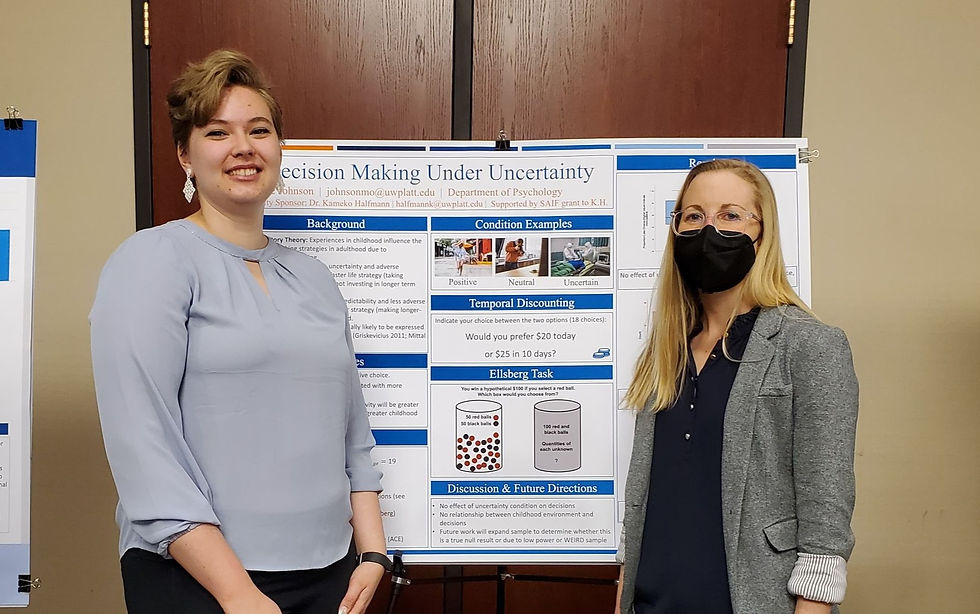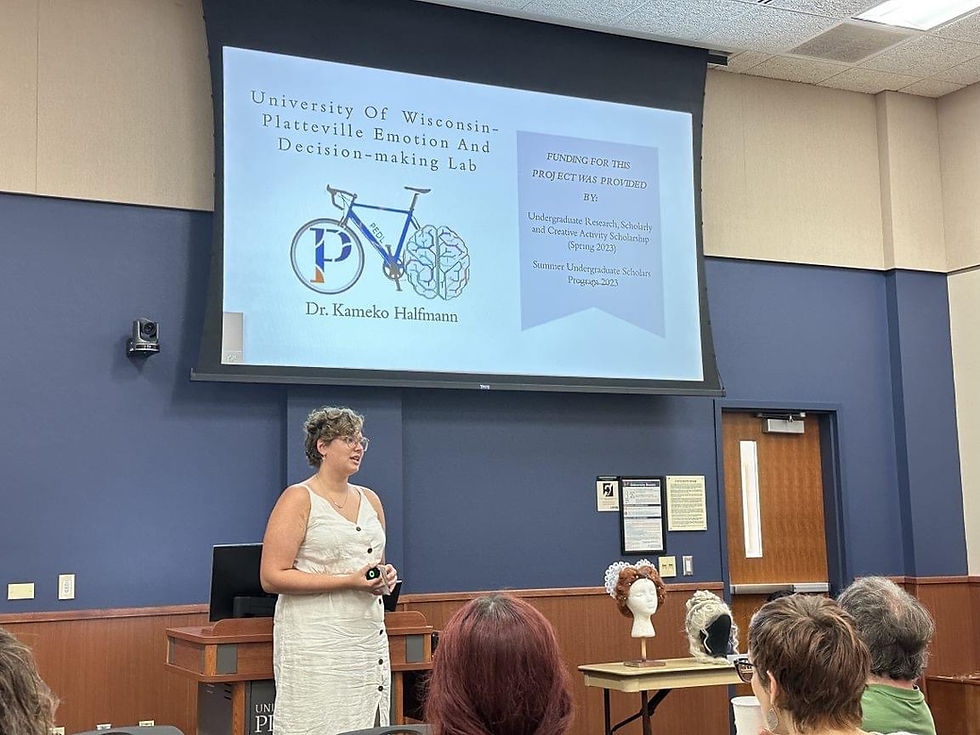Decision-Making Under Uncertainty
- johnsonmo8
- Dec 24, 2022
- 1 min read
Updated: Jun 2, 2023

In April 2022, I was able to present the research Dr. Kameko Halfmann and I had completed at the Pioneer Creative Activities and Research Day (PCARD) at the University of Wisconsin- Platteville. The study was focused on decision making trends and the impact mortality cues had on them. We specifically considered mortality cues related to COVID-19. Overall, we f0und no relationship between uncertainty and decision making regarding COVID-19 mortality cues.
Background
Our study was based on life history theory. This theory considers experiences in childhood to influence the decision-making strategies in later adulthood. This this due to reinforcement learning. A child with more uncertainty and adverse experiences will develop a faster life strategy (taking immediate opportunities, not investing in longer term strategies) in adulthood. Inversely, a childhood that has more predictability and less adverse experience will relate to a slower strategy (making longer-term investments) in adulthood. These decision patterns are especially likely to be expressed in uncertain or stressful situations (Mittal 2014, Griskevicius 2011)
Hypotheses
Uncertainty will elicit more impulsive choice.
Childhood adversity will be associated with more impulsive choice.
The effect of uncertainty on impulsivity will be greater among individuals who experienced greater childhood adversity.
Methods
Participants:
90 UW-Platteville students (56 Male, Mean Age = 19)
Participants completed the study online through a program called SONA. Upon selection of the study, they were provided with a screen containing the consent form. Once they gave their consent to participate, they were requested to fill out demographic information.
Upon completion of the demographics (age, gender identity, race, and parental or guardian achievement of bachelor’s degree) the participants were randomly assigned to one of three conditions (Positive, Neutral, or Uncertain). Each condition had five separate photos related to their category. After each image they were asked, “Does this image depict multiple people?” (Yes, No) This prompt was a decoy and was intended to ensure the participant was looking at the prime.

All participants completed two decision tasks, the Ellsberg task and the temporal discounting task. The Ellsberg task included instructions stating,
“Imagine you can draw a ball from one of two boxes. In the first box, there are 50 black balls and 50 red balls. In the second box, there are 100 balls, but the exact quantity of the red and black balls is unknown. If you draw a red ball, you win a hypothetical $100. Which box would you choose from?”

There was also the image (to the left) included depicting what the statement above asked the participants.
The temporal discounting task consisted of 18 choices with the following instructions,
“You will be asked to make a series of choices between a monetary option that comes sooner and a monetary option that comes later. For example, you might choose between $20 today and $50 in 30 days. There are no right or wrong answers. You should simply choose the option you prefer.” The monetary amounts presented to the participants varied between $20 and $10,000. The first delay varied between today and “in 5 days.” While the second delay varied between “10 days” and “365 days”. The choices were randomly ordered.
Upon completion of the decision-making tasks the participants completed the following questionnaires: 6-item Uncertainty & Avoidability scale (Mittal & Griskevicius, 2014), Childhood Socioeconomic Status (SES) questionnaire (Griskevicius et al., 2011), and Adverse Childhood Experiences (ACE) questionnaire (Felitti et al., 1998).
The Uncertainty & Avoidablity scale contained six questions that were rated on a seven-point Likert scale (1-Not at all to 7- Definitely) (Mittal & Griskevicius, 2014). The statements included items such as, “today’s world is more unpredictable than before” and “ I can do things to avoid many of the negative effects of this new reality”(Mittal & Friskevicius, 2014).
The Childhood SES questionnaire was three questions rated on a seven-point Likert scale (1- Strongly Disagree to 7- Strongly Agree) (Griskevicius et.al., 2011). Inside this scale participants were asked about the type of childhood they grew up in, “ I grew up in a relatively wealthy neighborhood” and “ My family usually had enough money for things when I was growin up” (Griskevicius et at., 2011).
Finally, the ACE contained 10 statements pertaining to adverse childhood experiences. The participants were to respond select the response that best represented their personal experience in relation to the statement (Yes, No, Prefer not to answer) (Felitti et.al., 1998). The ACE included statements, such as, “ Did you feel that you didn’t have enough to eat, had to wear dirty clothes, or ahd no one to protect or take care of you?” and “Did a parent or adult in your home ever hit, beat, kick, or physically hurt you in any way?” (Felitti et. al., 1998).
The participants were then provided with a debriefing that included the purpose of our study with the background, hypotheses, and the independent and dependent variables.
Results
No significance was found inside the results.

Discussion & Future Directions
There was no effect found of the uncertainty on decision making and there was also no relationship found between childhood environment and decision-making style. Future work should expand the sample to a more variable sample that is not primarily college students. It is possible our results are due to a lower power from our WEIRD (Western, Educated, Industrialized, Rich, and democratic) sample and if it is a true null result.
References
Griskevicius, V., Tybur, J. M., Delton, A. W., & Robertson, T. E. (2011). The influence of mortality and socioeconomic status on risk and delayed rewards: a life history theory approach. Journal of personality and social psychology, 100(6), 1015.
Mittal, C., & Griskevicius, V. (2014). Sense of control under uncertainty depends on people’s childhood environment: A life history theory approach. Journal of Personality and Social Psychology, 107(4), 621–637. https://doi.org/10.1037/a0037398




Comments